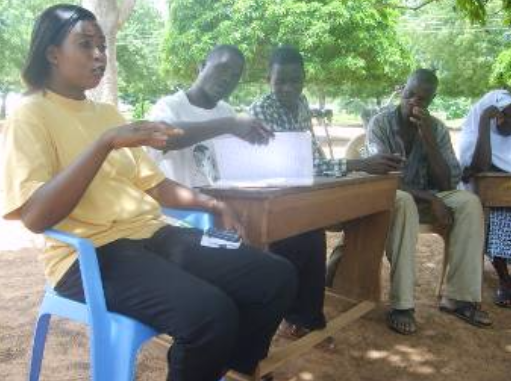
Songtaba: Empowering Girls to Protest Violence and Go to School
By AdministratorSongtaba means “let's help one another” in the local language, Dagbani. Songtaba is committed to the realization of the aspirations and rights of women and children in the northern region of Ghana. They have been working with organizations who share a vision of a violence-free and just society where women and girls enjoy their fundamental rights. Songtaba roots its work in the values of selflessness, integrity, and fairness. Selflessness means the interests of vulnerable groups overrides the interests of Songtaba staff and partners. Integrity means ethically and efficiently managing funds. Fairness means equal distribution of resources in their programming.
Songtaba’s “Stop Violence Against Girls in School” (SVAGS) Project is one program that addresses girls’ right to violence-free lives and access to education. The program established Girls’ Clubs in 13 schools that brought girls together to discuss and learn ways of improving their conditions in school. The Girls’ Clubs help girls build confidence and resources to resist violence. When Mahamud Fatayia, a 16-year-old in the program, was being harassed by a local man who declared his love for her and threatened violence against her if she didn’t accept his proposal, her first response was to not leave her house. But after two weeks home, she decided to tell her Girls’ Club mentor. The final result was that her harasser stopped, she says, “I now move freely in town without any fear.”
Another part of the SVAGS Project is Community Advocacy Teams (CAT). Teams are made up of community members who volunteer to advocate for the realization of women and girls’ rights in their communities. Volunteers are trained to monitor cases of abuse of any kind in their communities and effectively report them to the appropriate authorities. In once a case, a 30-year-old man who sexually assaulted a 15-year-old girl is in prison as a direct result of CAT intervention. In another case, Agnes Maogmin’s parents wanted her to end her education and marry against her wishes. After looking to her Girls’ Club for advice, she went to CAT. CAT members were able to convince her parents to allow her to continue her education and got her uncle to pay for it. She said, “I believe that the exposure I derived from the Regional Girls’ forum actually influenced my decision to seek support from the Girls’ Club because I had a sense of purpose for once in my life as a girl.”
Girls in the SVAGS program report personal empowerment and act with personal agency. The change goes beyond the girls themselves. A government officer, Augustine Sa-ad, the District Director of the Commission on Human Rights and Administrative Justice in Nanumba, was skeptical of the impact SVAGS would have. But he reports that the structures SVAGS has put in place has become the best means of referral for his commission. He says, “the network has made the commission more conscious, visible and active in facilitating redress for abuse cases without marring social relationships and also not compromising the rights of girls to be enrolled and retained complete their education.”
Songtaba is making access to education a real possibility in a part of the world where violence, early marriage, and poverty often exclude girls from this right and they’re fostering confidence on the way.
